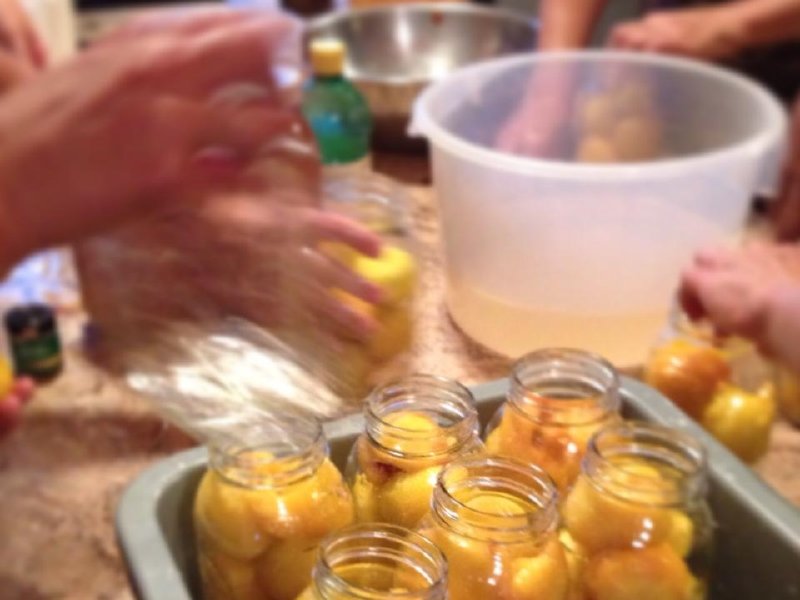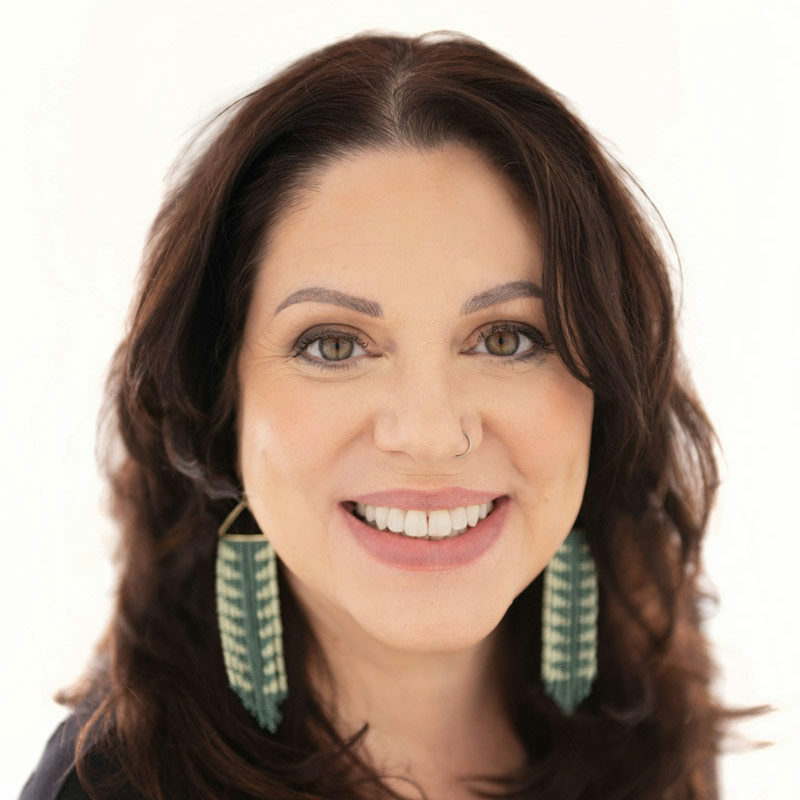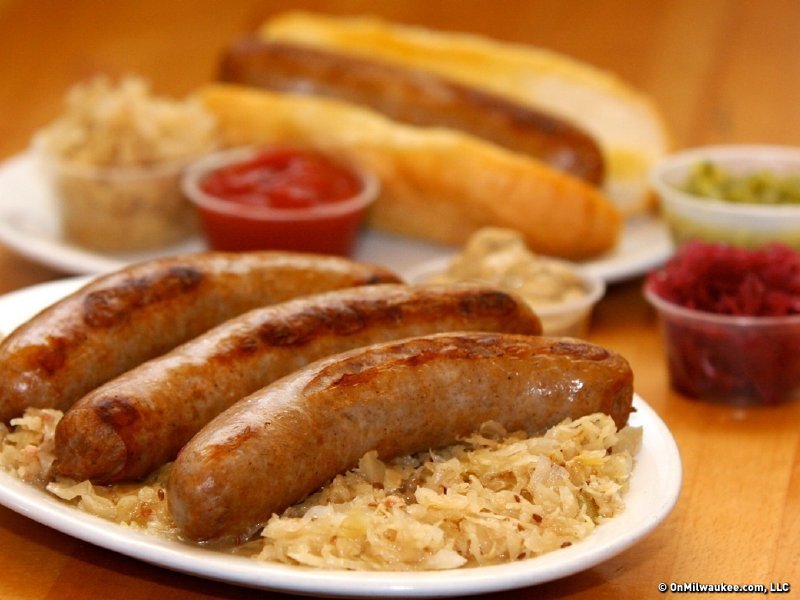Bay View’s Christina Ward is a Master Food Preserver which basically means she’s an expert in canning food.
Ward will be the first to tell you that canning food was originally a "dark art" practiced predominantly by witches and alchemists. Much later, canning was ditched in a feminist wave of "woman’s work" rejection and later it regained popularity thanks to a resurgence of DIY culture and people taking more active roles in their food sources.
"I was lucky enough to discover punk rock and see the natural connection between rejecting commercial culture and utilizing my odd set of primitive skills," says Ward. "I found a few like-minded friends, and we encouraged each other with our explorations of these skills. All of us have gone on to become ‘expert’ in our little niches."
Ward has led scores of classes and taught more than 2,500 people how to safely and effectively can food. She not only sees the venture as a healthy, money-saving supplement to food acquisition, but also as a practice that connects the community and offers an alternative to what would otherwise end up waste.
OnMilwaukee.com: When did you get into canning? Who taught you originally?
Christina Ward: I spent many summers with my paternal grandma on her farm near Black River Falls. Wood furnace! Outhouse! No telephone until 1976! She was of the Old Ways and I loved it. I learned so many things from her. I’m also very good at curing boils.
OMC: What did you start canning?
CW: I began, as many canners do, with jams. With some imprecise math, I’ve been canning for at least 35 years. I preserve nearly everything, but jams are my mainstay with Kick Out the Jams (Ward's canning business).
OMC: When and how did you take your canning to the next level?
CW: I’m a self-taught everything. I did not have the funding to go to school but never let that stop me. I’m a voracious reader and tinkerer. There is great value in understanding not only the concepts but the mechanics of how anything works.
Later, I discovered the Master Food Preserver program which is a vestige of the late 1800s Land-Grant University system. It was all part and parcel of the idea that universities were disseminators of real and practical science. These programs put experts into the field to work with producers; they act as resource as well as change-agent. In Wisconsin’s case: The Master Food Preserver is limited to one, sometimes two, per county; they assist people with preservation questions and teach folks the latest, science-based techniques.
Specifically, the training for me consisted of a combination of written and practical exams, and the creation of a curricula for teaching, and developing a community partner to host classes. Since its inception, the program has been a rural one. I had to do a tremendous amount of nagging, cajoling, phone calling to state elected representatives – and whining – to authorize me to begin the certification process.
I like to think that the numbers prove that the program in Milwaukee is an ongoing success. Since I began teaching in January 2012, over 2,500 individuals have taken a food preservation class from me.
I think we have become too romanticized about ‘chef culture.' I like to think I’m going back to the matriarchy. Let’s pass down this knowledge. Let’s not make it so rarified and up your nose. If I hear people talking about ‘elevating’ food items; what I hear them saying is: Your culture isn’t good enough. You need me to sprinkle my privilege on it to make it acceptable. (Explicative) that.
OMC: What do you can? Do some of the items / all of the items come from your garden?
CW: I can everything! I live in Bay View with a few 8x4 garden boxes. We don’t produce that much. What I mostly do is foraging and gleaning. I have a network of fruit trees and bushes around town that I maintain and harvest with the blessing of the – mostly – older folks who own them. Our immigrant grandparents weren’t letting anything (even a small city yard) go to waste. Many of them planted fruit trees. And now generations later, the original owners are unable to care for the trees or the new owners of the homes have no idea how to care for the trees.
I’m terrible. If I see a nice tree, I’ll knock on doors, leave notes, ask the neighbors: whatever it takes. But I never pick without permission. I always give back some of the harvest to the owner in whatever form they want it: some want the picked fruit, some want canned goods. I have one lady, Marilyn, who has the most glorious pear tree. She comes to the market and picks out things made with ‘her’ pears but also other items. Because, as she said, "I get sick of pears."
And that’s really more to my mission. Building the value of the food. Of these plants. Of these skills. I get such a cheap thrill when someone makes the connection that the old apple tree in their yard that was long considered a nuisance has real and tangible value.
I also have farmer friends and do a lot of wheeling and dealing. At Pinehold Garden, I’ll glean items that aren’t ‘good enough’ for the markets or CSA boxes. At Farm 45, I’ve traded knowledge and specialized canning supplies for fruit. And so on.
OMC: How often do you teach classes? Where do you teach them? How much are they? Anything else you want to say about your classes / upcoming classes?
CW: I teach throughout the year. We follow the seasons and try to focus on the specific techniques. More than just canning, I have classes in making jerky, pressure canner operations, and lacto-fermentation. We’ve also expanded the classes to some other areas of lost kitchen arts. Bread baking and cookie making.
OMC: Is this your "full time gig" or do you do other things to make money?
CW: I’m a hustler! I teach food preservation, I also sell my preserved items at the Milwaukee County Winter Farmer’s Market and the Fox Point Market. I write about food and people. I currently write the DIY Column for Edible Milwaukee Magazine. I do recipe development and testing for cookbooks. I’m always on the move!
OMC: Why is canning important?
CW: Food preservation is about a connectivity to the land and to our history. This was, traditionally, ‘women’s work.' In past waves of feminism, a lot of the old traditions were lost. Understandably so, because the work itself had been marginalized. I believe there is great power in learning these skills. We are re-claiming this ‘women’s work’ as what it really is: the work of keeping people alive. I’ve seen people giggle-smile with great joy as they realize that they can do this. There is power in this.
Best of all, to me anyway, is how it builds community. Really. I walk into Riverside or Juneau or Gaenslen or Brinton and there are a room full of people from all over Milwaukee. Truly diverse in age, ethnicity, neighborhood, cooking skills, economics … and it’s quiet. By the end of class, it’s loud. People are laughing and talking. Some have become friends. And I have met the best people. Not to get too fruity, but people wonder how to bridge the societal divides in Milwaukee? Take a rec class!
OMC: You grew up in Milwaukee. Where did you go to high school / college? How long have you lived in Bay View? You have one child and a husband; what else do you want readers to know about you?
CW: Yup, Milwaukee – Bay View, through and through. I went to Bay View High School. Started studying history / comp lit at UWM and was only able to afford a semester and a half or so. But again, I’m tenacious and curious, so that’s gotten me further along. I refuse to be ignorant.
OMC: Is canning a difficult thing to learn?
CW: Like many things, learning the basic concepts is entirely within every person’s capabilities. Perfecting the skills, that takes a lifetime.
In medieval times, jam / jelly making was considered alchemy. Only witches and alchemists made jams and jellies. It was both medicinal and a dark art. Even today I consider it alchemy, as it is both science and art. There is real chemistry and physics that goes into making a preserved food item just that: preserved. The art is making it taste good. I begin every class with the same bad joke: If you screw up canning, someone could die. And if you’re going to kill someone, do it with purpose, not accidentally.
For more information, contact Christina Ward at (414) 339-9918. You can also follow her on kickoutthejamsmke.tumblr.com or on Facebook at Kick Out the Jams MKE.
Learn more about Ward's classes at: milwaukeerecreation.net and rec.nicolet.k12.wi.us.
Molly Snyder started writing and publishing her work at the age 10, when her community newspaper printed her poem, "The Unicorn.” Since then, she's expanded beyond the subject of mythical creatures and written in many different mediums but, nearest and dearest to her heart, thousands of articles for OnMilwaukee.
Molly is a regular contributor to FOX6 News and numerous radio stations as well as the co-host of "Dandelions: A Podcast For Women.” She's received five Milwaukee Press Club Awards, served as the Pfister Narrator and is the Wisconsin State Fair’s Celebrity Cream Puff Eating Champion of 2019.







